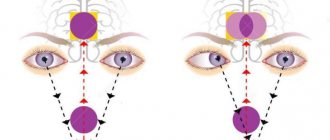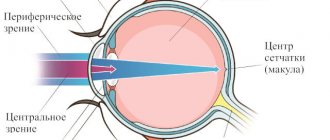Why do my vision get dark and my head feel dizzy?
If a person has excellent health, but from time to time his eyes darken, then this symptom is not always associated with any pathologies. Although it is impossible to exclude the disease 100%.
The main factors that lead to darkening of the eyes are:
- Lack of fluid in the body. To avoid health problems, you need to drink at least 2 liters of water every day.
- Prolonged hunger strike. A similar symptom is often observed in people who adhere to a lenten menu or are on a strict diet.
- Age-related changes in the body: menopause, old age, puberty.
- Adherence to bad habits. In this regard, smoking, alcohol abuse and drug use are dangerous.
- Excessive physical activity that is beyond human strength.
- High level of hemoglobin in the blood.
- Lack of vitamins and minerals.
- Diabetes mellitus and other endocrine pathologies.
- The period of bearing a child.
Blood pressure problems
Dizziness, quite severe, often occurs in people with low blood pressure. Their blood pressure sometimes drops below 100/60 mmHg. And it leads to severe discomfort in the body: tinnitus, dark spots in the eyes and severe headaches. This condition often leads to fainting. Low blood pressure is often observed in pregnant women and teenage children. Therefore, if a person is aware of his low blood pressure, then he does not need to make sudden movements.
Why does it get dark before your eyes when you get up?
People often notice that their vision becomes dark when they suddenly rise from a place. The main reason for this symptom is a lack of oxygen in tissues and organs. This condition is characterized by the term hypoxia. Lack of oxygen causes orthostatic hypotension, which often develops with heart disease. If your eyes darken when getting out of bed, this may indicate that the person has low blood pressure.
Doctors often hear complaints of darkening of the eyes from patients who take medications such as:
- Vasodilators.
- Diuretics.
- Antidepressants.
With a sharp decrease in blood pressure, a person’s vision will always darken. In this case, symptoms such as:
- Weakness in the body.
- Decreased attention.
- Dyspnea.
- Memory impairment.
Darkening in the eyes should not be ignored. First you need to sit down so as not to get injured. Sometimes the darkness in the eyes goes away after the person calms down. When this phenomenon occurs frequently, you need to go to see a doctor.
Vegetative-vascular dystonia
This disease often occurs in adolescents. It is associated with insufficient maturity of the endocrine and nervous systems. Manifest in one-time attacks or have a chronic course.
The resulting darkness in the eyes is characteristic of hypotensive dystonia. During the next attack, a person’s pulse quickens and his vision darkens. Such patients complain that the chest is heavy, there is not enough air, and there is weakness with headache. Symptoms of vegetative-vascular dystonia include cold extremities and frequent fainting.
Dystonia is caused by exhausting physical activity, vitamin deficiencies, and poor nutrition among middle-aged people.
What to do if your vision suddenly gets dark?
If your vision gets dark and your head begins to feel dizzy, then in order to cope with the attack, you need to follow the following recommendations:
- It is necessary to try to saturate the body with the maximum amount of oxygen. For this purpose, you can go outside, take a comfortable position, and breathe fresh air. If you are in a stuffy room, open the windows. If there are items of clothing on your neck or chest that restrict breathing, you need to get rid of them.
- To avoid falling, you need to sit down or lie down. It’s good if it is possible to raise your legs so that they are higher than your head. This way, blood will flow better to the brain.
- Be sure to use a tonometer and measure your blood pressure.
When a person clearly understands the cause of the attack that occurred, efforts need to be directed towards eliminating it. If a diabetic’s eyes get dark due to hunger, you can drink a glass of sweet water. This measure will increase blood glucose levels and cope with an attack.
If your head is spinning and your eyes are darkening due to prolonged exposure to the sun, then you need to go into the shade or into a cool room.
When the cause cannot be determined and the attack does not go away, an ambulance should be called. Doctors will examine the person and tell you how to cope with the existing problem.
Provided that the attack happened once, you should not panic. However, regularly occurring darkening of the eyes requires seeking medical help.
What not to do?
If a person does not know the cause of the attack, it is prohibited to take any medications. Otherwise, you may harm your health. You should not make sudden movements, you should not quickly turn your head or tilt it down, as this can lead to a fall. You definitely need to visit a doctor or call a medical team to your home.
Squatting and bending are prohibited. You need to take the most comfortable position possible. You should not start smoking or drinking alcohol after the attack is over.
Reasons you can't ignore
Sometimes a person’s vision becomes dark and dizzy due to various diseases, including:
- Vegetovascular dystonia. The head may not only feel dizzy, but also hurt. Painful sensations are localized in the temples and in the back of the head.
- Cervical osteochondrosis. At the same time, a person’s head becomes dizzy and darkens, most often in the morning and evening. The attack intensifies when turning the head, bending over, or changing body position.
- Migraine. People with migraines experience severe headaches and dizziness, and may experience tinnitus. Patients often complain of increased photosensitivity and nausea.
- Diseases of the inner ear, which may be associated with disturbances in the functioning of the vestibular apparatus.
- Previous injuries to the skull and brain.
- Trinitarian neuralgia. At the same time, the person’s vision becomes dark. Treatment must be immediate, as the disease can cause serious complications. Most often, antibiotics are required.
- Cancerous tumors. Attacks of dizziness and darkening of the eyes will occur on a regular basis.
- Orthostatic hypotension. This pathology is associated with somatic and neurological disorders, which leads to a sharp decrease in blood pressure. The body has difficulty adapting to rapidly developing hypoxia, which leads to an attack of dizziness and darkening of the eyes. Most often this situation happens after a night's rest. The severity of symptoms and their duration may vary. Sometimes patients even faint. In addition, sweating may increase, and pain may occur in the epigastric region. Psychosensory impairment is a severe manifestation of hypotension. The disease requires high-quality therapy.
- Anemia, accompanied by a decrease in the level of hemoglobin in the blood. Normally, the blood contains a large number of red blood cells (erythrocytes), which are responsible for transporting oxygen to tissues and organs. With anemia, the body will suffer from oxygen starvation. First of all, this affects the state of the brain. Therefore, anemia is always accompanied by attacks of dizziness. The patient's skin turns pale and weakness increases. The disease can be triggered by various pathologies of the digestive system, growing tumors, etc.
- People with strokes may develop dizziness and blurred vision. In this case, arteries in the brain rupture, which leads to tissue damage. This condition requires emergency medical care.
- Attacks of dizziness plague patients with cardiovascular diseases, as they always provoke a disruption of blood flow to the brain.
- Hypoglycemia with a drop in blood sugar levels causes a patient with diabetes to become dizzy and have dark vision. In severe cases, the person may even fall into a coma.
- Diseases of the organs of vision. Dizziness often develops with cataracts, as the deterioration of blood flow in the eyeball leads to a disruption in the transmission of information to the brain.
If a person feels dizzy all the time, and also gets dark in the eyes, you need to consult a doctor. Ignoring such symptoms will lead to serious consequences. The doctor will prescribe a comprehensive diagnosis to the patient and then select the necessary treatment.
Acute hypotension
The most common causes of a sharp deterioration in vision, complicated by weakness throughout the body and loss of consciousness, include acute or chronic hypotension - low blood pressure. An attack can be triggered by exposure to heat, heavy physical work, and even a sudden change in body position.
Low blood pressure causes an uneven supply of blood to the brain, which causes oxygen starvation. Due to the fact that the optic nerves connect directly to the main organ of the nervous system, the problems that arise primarily affect the eyes.
Diagnostic methods
A person who goes to the doctor with complaints of dizziness and darkening of the eyes needs to be prepared for the fact that he will be prescribed a lot of tests. Only a comprehensive diagnosis will allow us to establish the true cause of the attacks.
Possible diagnostic measures:
- Determination of pressure level.
- Ultrasound of the vessels of the neck and brain.
- MRI of the brain.
- Encephalography.
- Computed tomography of the cervical spine. In addition, this test can detect cancerous tumors.
- Fundus examination, eye pressure measurements.
- Donating blood for general and biochemical analysis. Be sure to determine the level of cholesterol, hormones and hemoglobin in the blood.
- Performing bacterial cultures and blood draws to determine viral and bacterial infections, as they can lead to disruption of brain function.
- Performing neurological tests.
Associated symptoms
Most often, the blurred vision is accompanied by other symptoms, the analysis of which can accurately determine the disease. Associated symptoms include:
- The appearance of flashes and lightning before the eyes (damage to the retina);
- frequent appearance of headaches and rainbow circles from light sources (acute attack of glaucoma);
- manifestation of redness, excessive tearing, unpleasant discharge from the eyes (keratitis, etc.).
Treatment
Sometimes, in order to get rid of attacks, it is enough to simply change your eating habits, as well as follow a routine and devote a sufficient amount of time to sleep. Although in some cases dizziness is caused by dangerous conditions that require serious treatment.
Drugs that can be prescribed to the patient:
- Antibiotics and anti-inflammatory drugs. They are prescribed to treat otitis media, as well as infections that affect the brain.
- Antidepressants, sedatives and drugs that normalize blood flow. This treatment is indicated for patients with VSD, with surges in blood pressure, as well as for people who have suffered severe stress or are suffering from depression.
- B vitamins, calcium antagonists and drugs that improve brain nutrition. Such drugs are indicated for use by patients with hypoxia and people engaged in heavy mental work.
- Massage, physiotherapy, as well as taking medications that normalize vascular tone are indicated for patients suffering from osteochondrosis or other diseases of the cervical spine.
- Hormones should be taken by patients with disorders of the endocrine system.
- Iron supplements are prescribed to patients with anemia.
The dosage of medications, as well as the duration of the course of treatment, is determined by the doctor, based on the individual characteristics of the course of the disease.
What measures are effective in preventing ocular migraines?
To prevent atrial scotoma from recurring or to pass in a milder form, you need to take care of prevention:
- Be sure to stick to your usual daily routine: go to bed and get up at the same time, avoid sleep deprivation and do not allow yourself extra hours of sleep.
- Avoid overwork and rest often.
- Give up bad habits - smoking, drinking alcohol and energy drinks.
- Try to avoid stressful situations and learn to react more calmly to stress factors.
- Normalize your diet by eliminating unhealthy foods and reducing the consumption of trigger foods that can cause ocular migraines. Eat small portions, avoid long breaks between meals.
- Lead an active lifestyle, but balance physical activity with your age and health status. Exhausting workouts can backfire, so give preference to long walks, swimming, and Nordic walking.
- Treat chronic diseases if they are the cause of atrial scotoma.
- If ocular migraine attacks recur frequently, your doctor may prescribe special medications to prevent the disease. Their use reduces the frequency of attacks and protects against the transition of atrial scotoma to a chronic form.
Drug prevention of ocular migraine is prescribed if:
- Attacks recur more than twice a month;
- Migraine relief medications do not provide the desired effect or for some reason the patient cannot take them;
- As a result of the attack, persistent neurological defects or epileptic seizures begin.
Medicines for migraine prevention may belong to the group of antidepressants, calcium channel blockers, beta-blockers, and antiepileptic drugs. They are selected individually by the doctor, depending on the clinical picture of the individual patient.
Remember that the symptoms of an ocular migraine are temporary; after the attack, your vision will be restored. And timely diagnosis and treatment under the supervision of a neurologist will help prevent or alleviate subsequent attacks of atrial scotoma.










